If you’re like most people, you probably don’t know much about car air conditioning. You turn it on when it gets hot and turn it off when it gets cold.
The last thing you want to deal with on a hot day is a car that’s too warm. If your AC isn’t cooling your car down the way it should, you might need to have it recharged. But, did you know that sometimes the AC can be overcharged?
In this blog post, we will discuss how to tell if your car’s AC is overcharged and what to do about it. Stay cool!
Key Takeaway
- The signs that your AC is overcharged include no cooling air coming from the vents, loud noise coming from the AC compressor, the engine might work a bit differently, high-pressure reading when testing the AC, or the compressor isn’t activating at all.
- Driving with an overcharged AC can lead to strain on the compressor, potential failure or damage, and may even result in the air conditioner blowing out hot air, making it inadvisable to drive under such conditions.
How To Tell If Your Car’s AC is Overcharged?
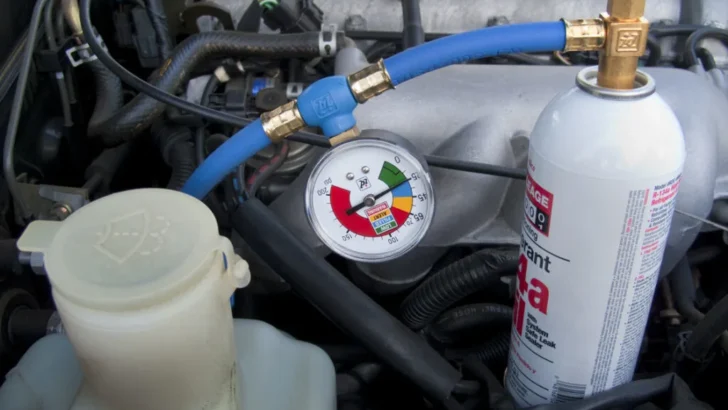
The air conditioning system in your car is a complex piece of machinery that needs to be properly maintained in order to function correctly.
One issue that can occur is overcharging, which can lead to a number of problems. If you think your car’s AC may be overcharged, there are a few signs to look for.
1. No cooling air coming from the vents
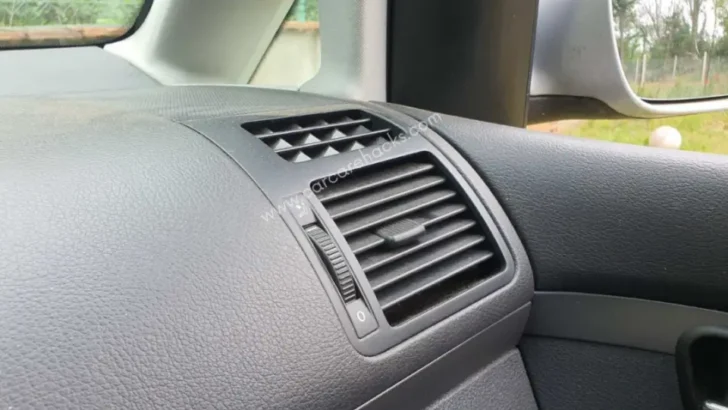
If your air conditioner is overcharged, it can actually cause the unit to stop producing cold air. This is because the compressor needs to work harder to circulate the refrigerant if there is too much of it in the system. As a result, the compressor can overheat and shut down, causing the AC to stop working altogether.
The most common symptom of an overcharged AC system is no cold air coming from the vents. In order to properly diagnose this issue, it is important to first check the level of refrigerant in the system.
If the refrigerant level is low, then it is likely that there is a leak somewhere in the system. Once the leak has been repaired, the system can be recharged with refrigerant. However, if the refrigerant level is too high, then it will need to be removed from the system. This can usually be done by a professional AC technician.
2. Loud noise coming from the compressor
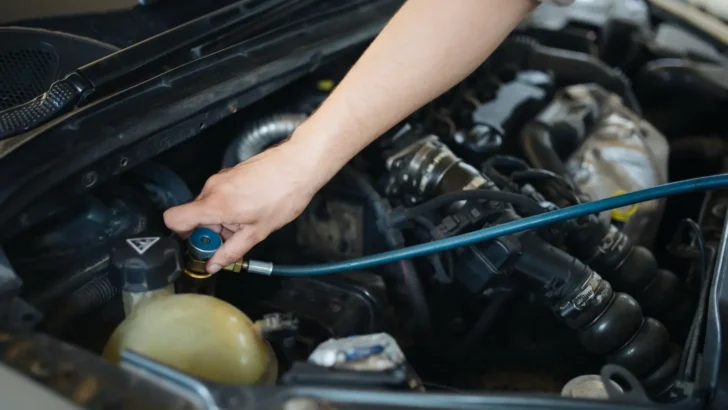
The car AC compressor is the heart of the system. It takes low-pressure, refrigerant gas and compresses it into a high-pressure, hot gas. That hot gas then flows through the condenser coils (looks like a big radiator in front of your car) where it releases its heat to the outside air and becomes a liquid again.
The now cooled and liquefied refrigerant then flows through an expansion valve where it expands back into a low-pressure, cold gas and flows into the evaporator coils located in the blower housing (the big black box in your car that contains the blower motor).
The cold refrigerant then absorbs heat from the inside air blowing across the coils and turns back into a hot gas. That hot gas then flows back to the compressor where the cycle starts all over again.
If your AC is overcharged, it can cause the compressor to make a loud noise. The compressor is responsible for circulating the refrigerant throughout the system.
When too much refrigerant is present, it puts extra strain on the compressor which can lead to a rattling noise. In addition, the compressor may run hotter than normal which can shorten its lifespan.
If you notice your AC making an unusual noise, it’s best to have a professional check it out to determine the cause. Left unchecked, an overcharged AC can cause serious damage and may even require replacement.
3. Engine not working normally
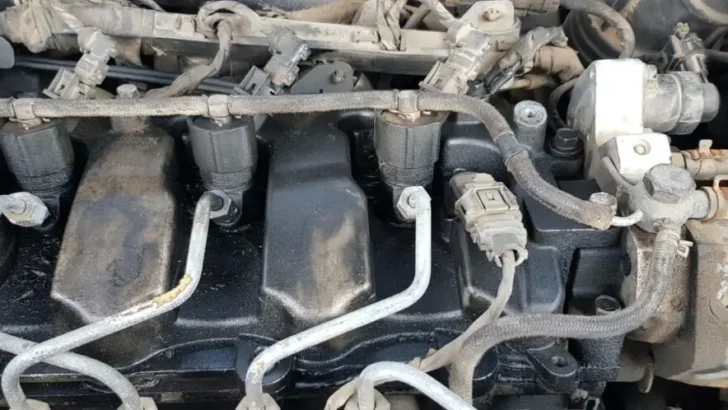
When a car’s air conditioner is overcharged, it puts a strain on the engine. The extra pressure from the overcharged AC can cause the engine to work harder than it needs to, which can lead to reduced fuel efficiency and increased wear and tear.
In some cases, an overcharged AC can also cause the engine to misfire or stall. If you notice that your car’s engine is working harder than usual when the AC is on, it may be time to have the system checked by a mechanic. Otherwise, you could be doing damage to your car’s engine and costing yourself money in fuel and repairs.
4. High-pressure reading when tested
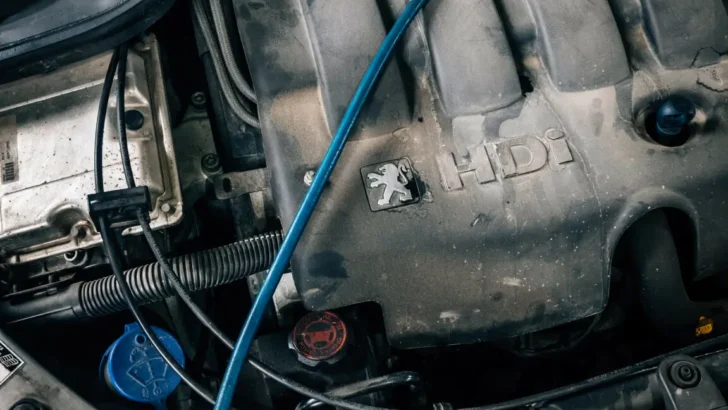
A car’s AC system is designed to circulate a refrigerant fluid through a closed loop. The refrigerant absorbs heat from the cabin of the car and then releases it outside.
In order to keep the system running smoothly, it is important to maintain the correct level of refrigerant. If too much refrigerant is added to the system, it can put stress on the compressor and lead to a high-pressure reading.
Additionally, overcharging the system can cause leaks and reduce the overall efficiency of the AC. As a result, it is important to only add the recommended amount of refrigerant to your car’s AC system.
Every car owner should know how to test the refrigerant level in their vehicle’s AC system. This simple task can be performed in just a few minutes and can save you a lot of money in the long run. The first step is to locate the low-pressure port on your AC system.
This is usually located near the evaporator core or the compressor. Once you have found the low-pressure port, attach the gauge to the port and turn on the engine.
With the engine running, note the reading on the gauge. If the reading is below 30 psi, then your system is low on refrigerant and needs to be refilled. Don’t forget to check for leaks before adding more refrigerant to your system.
Leaks can often be fixed with a simple sealant kit. By keeping an eye on your AC system’s refrigerant level, you can avoid costly repairs down the road.
5. Compressor failed
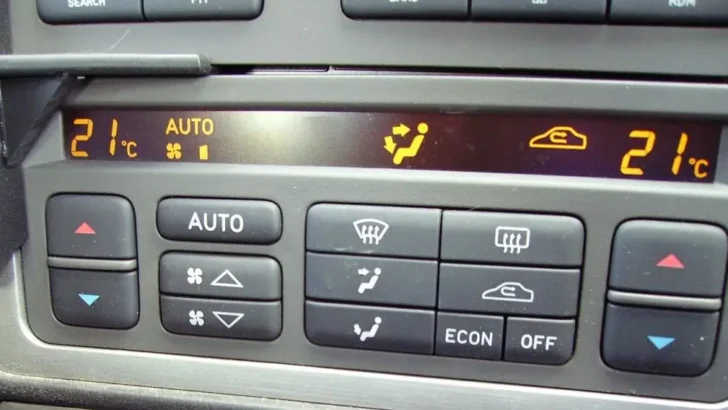
One of the most common reasons for compressor failure is overcharging of the AC system. When the system is overcharged, the compressor has to work harder to circulate the refrigerant, which puts extra strain on the compressor.
In addition, overcharging can reduce the efficiency of the system, causing it to run hotter and putting even more stress on the compressor.
Compressor failure can also be caused by a loss of oil, which can happen if there is a leak in the system. Without oil, the compressor will not be lubricated properly and will eventually seize up.
Compressor failure can be a costly repair, so it is important to make sure that your AC system is properly charged. If you suspect that your system is overcharged, have a qualified technician check it as soon as possible.
What To Do If Your Car AC is Overcharged
If your car AC is overcharged, it’s recommended to seek professional assistance to correctly diagnose the issue and remove excess refrigerant, ensuring optimal performance and preventing potential damage to the system.
Diagnosing an Overcharged AC
An overcharged AC can be identified through symptoms like inadequate cooling, hot air coming from the vents, unusual noises from the compressor, high-pressure readings, and sometimes even engine failure. A professional diagnosis will confirm whether the AC is indeed overcharged.
Fixing an Overcharged AC
The most common solution for an overcharged AC is to have it re-gassed by a mechanic. This process involves using a machine with vacuums to remove or bleed excess coolant. The machine then monitors pressure levels while running to ensure the system is functioning properly.
Potential DIY Solution
For those comfortable with auto maintenance, you might consider bleeding the system yourself. However, it should be noted that this should only be attempted if you have the necessary skills and equipment. If not, it’s best to take the vehicle to a qualified professional.
Signs of an Overcharged AC
Overcharging can cause the AC compressor to struggle, often causing an audible gurgling or whining sound. Other signs include irregular pressures and a decrease in the system’s cooling efficiency.
Risks of an Overcharged AC
An overcharged AC can cause strain on the compressor, potentially leading to its failure. In severe cases, it can even result in engine failure. Therefore, it’s vital to address the issue promptly to prevent further damage.
Can You Drive With An Overcharged AC?
As the weather gets hotter, many of us find ourselves spending more time in the car. And while air conditioning is a great way to keep cool, it’s important to make sure that your AC unit is properly charged.
An overcharged AC unit can put a strain on the engine, and it can also lead to poor cooling performance. If you notice that your AC unit is blowing warm air, or if it seems to be working overtime, it’s best to have it checked by a mechanic.
Driving with an overcharged AC unit is not advisable, and it may even void your warranty. So if you’re not sure whether your AC unit is properly charged, it’s best to err on the side of caution and get it checked out.
One reason you shouldn’t drive a car with an overcharged AC is that it can lead to engine damage. When the AC is overcharged, it puts extra strain on the engine. This can cause parts to wear out prematurely or even break.
Additionally, an overcharged AC can cause the engine to overheat, potentially leading to a costly repair. Another reason to avoid driving with an overcharged AC is that it can make the ride uncomfortable for passengers because there will be no cold air coming out from the vents.
FAQs
How Does an Overcharged AC Affect Performance?
An overcharged AC system can lead to decreased performance and higher operating costs. The compressor may also make unusual noises, indicating a potential issue.
How Can I Confirm if My Car AC is Overcharged?
The most reliable way to confirm if your car AC is overcharged is by checking the pressure gauge. An overcharged AC system will display a higher pressure reading.
How Does an Overcharged AC Affect Cooling?
One of the most evident signs of an overcharged AC is faulty cooling. The vents may produce only slightly cooler air than room temperature, indicating a potential overcharge.
What are Other Symptoms of an Overcharged AC?
Other likely symptoms of an overcharged AC include no air coming out of the vents, weird noises from the engine bay, and a lit check engine light.
Can an Overcharged AC Cause Damage to My Vehicle?
Yes, an overcharged AC can put undue strain on the compressor, potentially leading to its failure. In severe cases, it can even cause engine failure.
Conclusion and final thoughts
In conclusion, keeping your car’s AC in good condition is important for ensuring a comfortable and safe driving experience.
Overcharging your car’s AC can lead to various issues such as decreased cooling performance, increased wear and tear on the system, and potential damage to other components.
